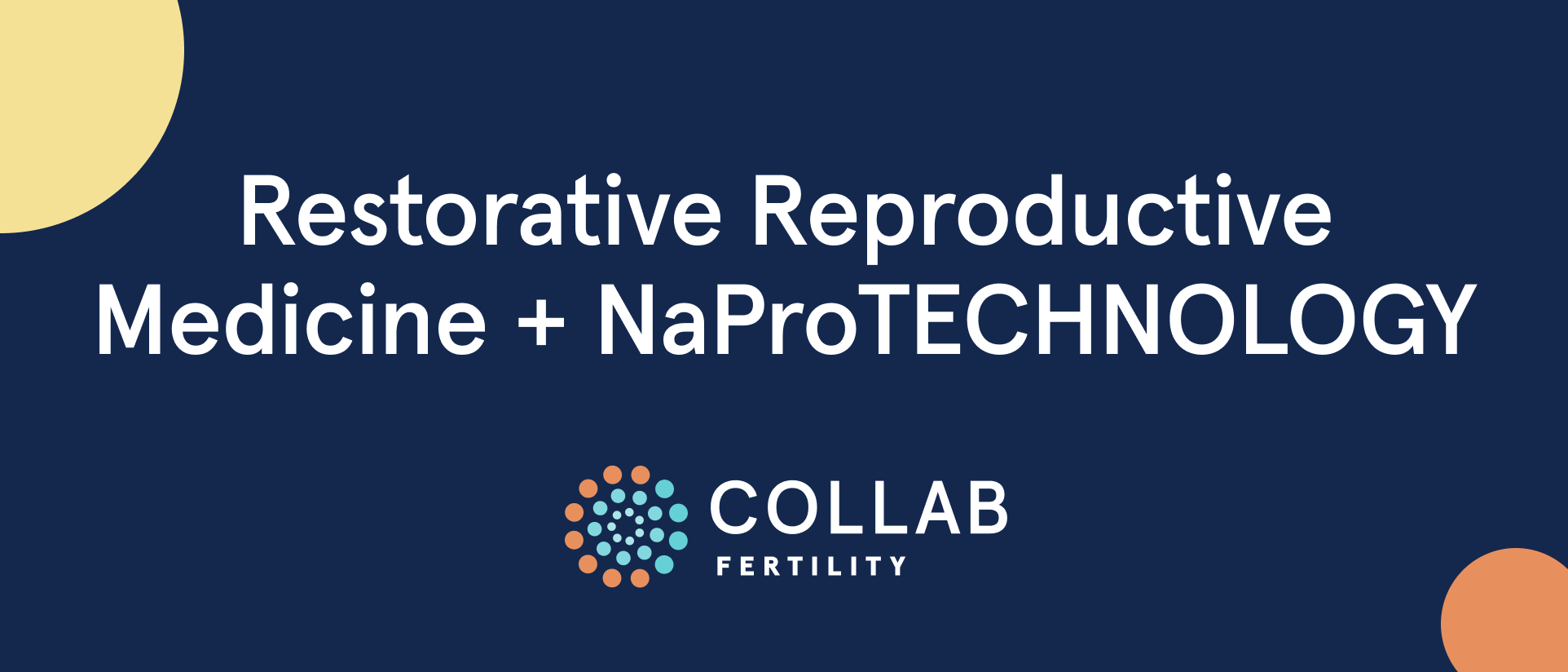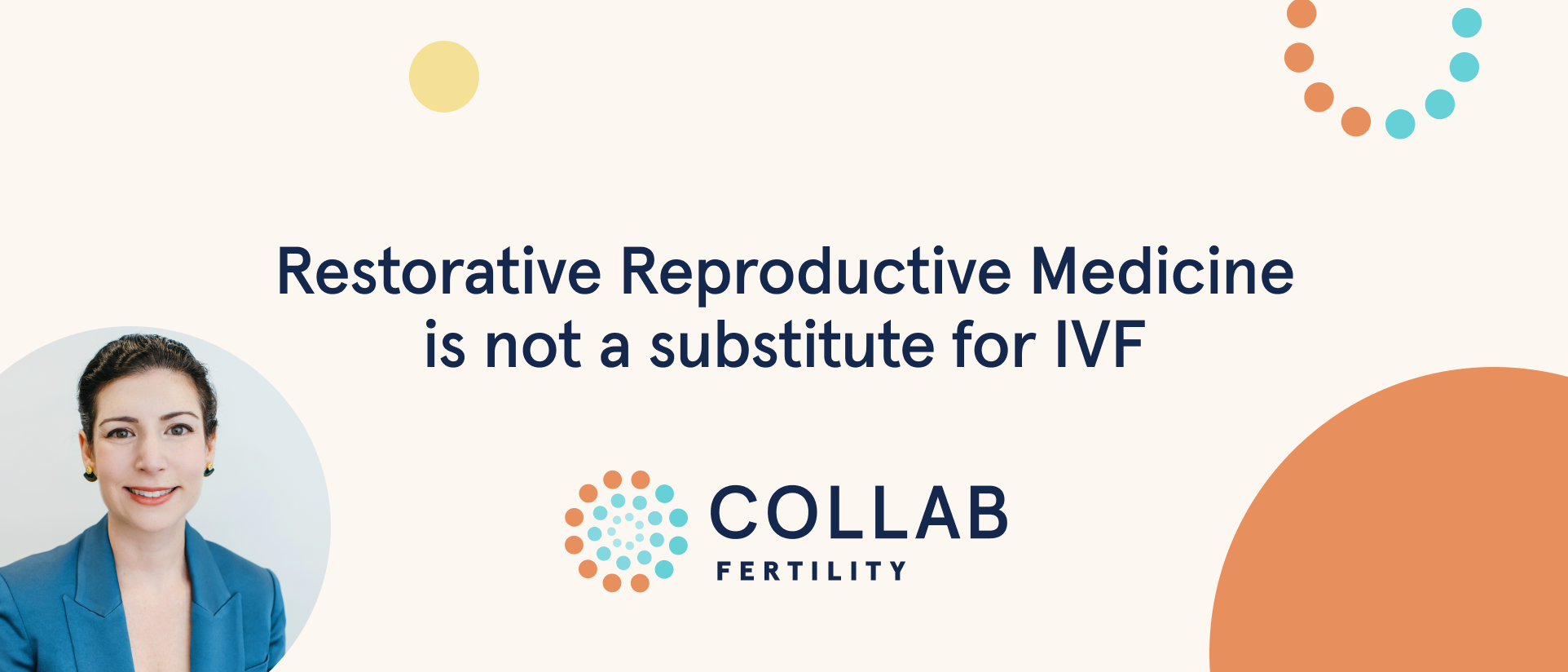
Restorative Reproductive Medicine and NaProTECHNOLOGY
The problem with “natural alternatives to IVF”: unethical, unhelpful, and exclusionary
Have you heard about Restorative Reproductive Medicine (RRM) and NaProTECHNOLOGY? They’ve been making headlines as so-called “natural” alternatives to IVF. Some politicians and media outlets are even promoting them as viable replacements for modern fertility care, a framing that Collab Fertility founder Dr. Thalia Segal calls “misleading and dangerous.”
As a board-certified reproductive endocrinologist and infertility specialist, Dr. Segal emphasizes that fertility care has always included restoring normal function: treating hormone imbalances, addressing PCOS or endometriosis, and supporting patients with nutrition and lifestyle counseling. What’s new and troubling is the suggestion that RRM alone is enough.
“Yes, fertility care begins with restoring normal function,” Dr. Segal explains. “But when these measures fail, science has given us extraordinary options—IVF, ICSI, genetic testing, fertility preservation, donor egg, gestational carriers—that RRM categorically ignores.”
Dr. Segal recently shared these concerns publicly in The Free Press. Read her full letter to the editor here, where she underscores why presenting RRM as a standalone solution does patients a disservice.
What is NaProTECHNOLOGY?
NaProTECHNOLOGY, short for Natural Procreative Technology, is a method of reproductive health management developed within Catholic moral teaching. It emphasizes tracking menstrual cycles, correcting hormone imbalances, and performing surgeries to treat underlying conditions such as endometriosis. Unlike conventional fertility care, NaProTECHNOLOGY categorically excludes IVF and other assisted reproductive technologies.
While some patients may benefit from cycle tracking and hormone optimization, NaProTECHNOLOGY limits access to critical tools like egg freezing, ICSI, genetic testing, and advanced embryo transfer technologies that often provide the only pathway to parenthood.
What is Restorative Reproductive Medicine?
Restorative Reproductive Medicine is a broader term that includes NaProTECHNOLOGY and other fertility philosophies that focus on “restoring” reproductive function. Like NaPro, RRM rejects assisted reproductive technologies such as IVF, donor eggs, or gestational carriers.
Dr. Segal notes that “RRM may serve as the first step in infertility care. But elevating it as a comprehensive solution turns back the clock, denying countless families the progress of modern medicine.”
At Collab Fertility, we go even further through The Collab Way, our evidence-based, whole-person model of care. From day one, patients receive nutritional counseling, education on endocrine disruptors like microplastics, and wellness resources such as acupuncture and therapy. These services support advanced treatments like IVF, ICSI, and fertility preservation, ensuring patients receive both integrative support and modern medical solutions.
What is the success rate of Restorative Reproductive Medicine?
While proponents of RRM cite case studies of successful pregnancies, the scientific data is limited, and reported success rates are significantly lower than those of IVF. Importantly, RRM often excludes entire patient populations:
- Patients with severe male factor infertility, who would have no path to parenthood without ICSI.
- LGBTQ+ families and single parents, for whom donor eggs, sperm, or gestational carriers are essential.
- Cancer patients, who often need urgent fertility preservation before treatment.
As Dr. Segal points out, “Take severe male factor infertility: without ICSI, millions would never have children. RRM offers them nothing. It also excludes LGBTQ+ families, single parents, cancer patients needing urgent preservation, and many others.”
What is a NaPro Doctor?
A NaPro doctor is a physician trained in Natural Procreative Technology. They typically focus on identifying hormonal or structural causes of infertility and correcting them through surgery or medical therapy. While these steps are important, they represent only part of a comprehensive fertility plan.
As Dr. Segal explains, “Standard fertility care begins with thorough diagnostics. We treat root causes—PCOS, endometriosis, thyroid disease, and others—and IVF is not the first step. But for many patients, IVF is the only path to a family.”
What is NaPro Fertility Treatment?
NaPro fertility treatment usually includes detailed cycle charting and tracking ovulation, hormone therapy to correct imbalances, surgical interventions such as endometriosis excision, and lifestyle counseling.
These interventions can be beneficial. But without the option of assisted reproductive technologies, patients may face delays that reduce their ultimate chances of success, especially as age remains the strongest predictor of fertility outcomes.
Dr. Segal shares a powerful example: “One of my patients underwent multiple surgeries for endometriosis and came to me for IVF at 39 with only one egg retrieved per cycle. Her chances of a healthy embryo were low, and she is now pursuing donor eggs—a path that might have been avoided had she pursued egg or embryo freezing prior to surgery.”
The Bottom Line
Restorative Reproductive Medicine and NaProTECHNOLOGY may play a role in addressing certain hormonal or structural issues, but presenting them as full alternatives to IVF is both misleading and dangerous. Patients deserve comprehensive, evidence-based fertility care not an artificially limited menu of options.
As the media and policymakers weigh how fertility care should look in the future, the message from Collab Fertility is clear: restoring reproductive function matters, but denying patients access to IVF, ICSI, egg freezing, and other modern treatments turns back the clock and strips families of real opportunities to build the future they deserve.
Want to learn more about Collab Fertility’s integrative, evidence-based approach? Schedule a consultation or read more about The Collab Way.
The Collab Way
At Collab Fertility, we believe patients deserve both whole body support and advanced medical options. That’s why we created The Collab Way, our integrative, evidence-based model of care. From day one, every patient has access to:
- Nutritional counseling tailored to fertility health
- Education on environmental toxins like microplastics and endocrine disruptors
- Wellness resources such as acupuncture and therapy referrals
These services are designed to support, not replace, proven treatments like IVF, ICSI, genetic testing, and fertility preservation.
The Collab Way = whole-person care + modern medicine.
________________________
Proudly Supporting Local Communities
Collab Fertility is honored to serve families in the East Bay like Danville, Alamo, Orinda, Lafayette, Moraga, Piedmont, and Walnut Creek, as well as many other communities in the Bay Area and beyond, including Oakland, San Ramon, Concord, Pleasant Hill, Santa Rosa, Novato, Napa, Sonoma, and more.
Latest Articles

Trump IVF mandate and lower drug prices: Here’s what you need to know

